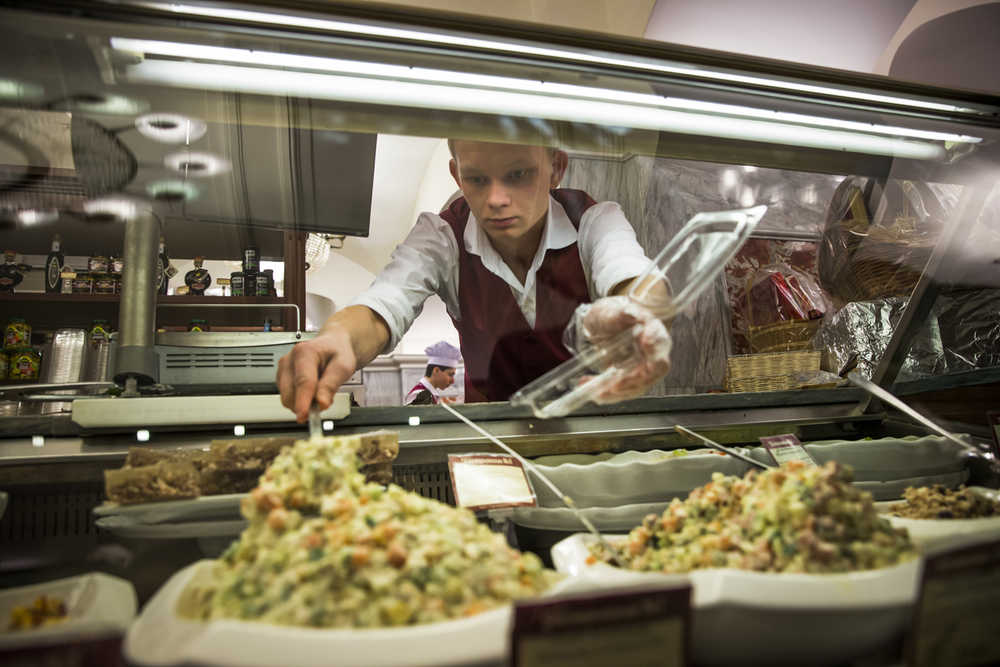MOSCOW — For most Russians, it’s not New Year’s without a Salad Olivier, a dish meant to augur prosperity. This year, soaring food costs mean the tradition can also be a painful reminder of how rapidly many Russians’ wealth is fading amid recession and Western sanctions.
The mix of chicken, potatoes, peas, carrots and mayonnaise — which was introduced by a Belgian chef in the 19th century, and shed richer ingredients like grouse and crayfish amid food shortages under the Soviets — will cost 35 percent more to prepare this year. The stiff rise, reported by the federal statistics office, comes amid the deepest economic downturn in President Vladimir Putin’s 15 years in office.
The economy has been in decline for a couple years due to sanctions and a slump in the price of Russia’s valuable oil exports. But this New Year’s Eve will arguably be the first in more than a decade when Russians are feeling the pain of recession at the table.
“Before, you could buy jewelry or expensive perfume for the New Year,” says 65-year old Nikolai Skomorokhov, who retired this month. “This time, it’s about the bare minimum. We’re mostly spending on the celebration.”
Skomorokhov, who is visiting his daughter and grandchildren in Moscow for the holidays from his hometown of Valdai in the northwest, says the usual items he would buy for the holiday became 30 to 40 percent more expensive over the year, causing him cut down on spending.
The national currency, the ruble, has fallen about 20 percent against the dollar this year, on top of a 40 percent slide in 2014, pushing up the price for imported goods. A Russian ban on Western food imports, imposed in retaliation for U.S. and European economic sanctions, has further hurt supply, pushing up prices.
The rise in the cost of a Salad Olivier, which is sometimes used informally as a benchmark for the cost of living since it contains several staple ingredients, is indicative of a rise in food costs. Groceries for a typical holiday dinner for two including vegetables, sausage, cheese, pickles and chicken would cost $80 this year, 28 percent higher than a year ago.
“This year, Russians are celebrating without much joy because the year has been tough,” says Marina Krasilnikova, a researcher at the polling agency Levada. “People are growing less confident in the economic situation of the country.”
Worries about the economy featured prominently in Putin’s annual news conference earlier this month, when journalists grilled the president about falling incomes and living standards. Yet the majority of Russians tend not to blame Putin, whose popularity remains buoyed by the annexation of Crimea in 2014, but his government.
Iraida Robkova, 81, says the 2000s were probably the most secure and happy years of her life before the economy went downhill last year: “We were free to speak what we wanted, to buy what we wanted, travel wherever we wanted and the prices were not that high.”
Robkova, who lives in Moscow, says she would not be able to afford a New Year’s dinner if it wasn’t for her daughter and son-in-law, who also help her pay for groceries and utilities.
Robkova blames the economic problems on Putin’s state ministers.
“Putin did a great thing: he got us Crimea back,” she says. “But things are difficult for him. His team is weak.”
Asya Yusupova, 47, moved to Moscow from the economically depressed Dagestan region in the south, where she made $114 a month as an arts teacher. She now works 12 hours a day as a nanny and lodges with her employers in the city center.
For Yusupova, the official inflation rate of 12 percent does not reflect reality: “Things are much more expensive now, maybe even twice as much.”
For her, recession is not about giving up perks like Salad Olivier but spending less on essentials.
“I have to cut on clothes,” says Yusupova. “I would like to pay for after-school classes for my children, but I can’t afford it now.”
Krasilnikova, the researcher at Levada, says Russians are unlikely to buy goods to hoard them, like they did last December, when the ruble tanked — simply because they have largely spent their savings.
“Only a third of Russians have savings. And people have been spending them the past year and a half,” Krasilnikova said. “People will still be enjoying the holiday but fewer people will have a feeling that the new year will be better than this one.”

